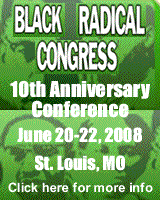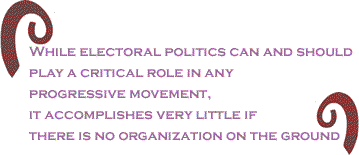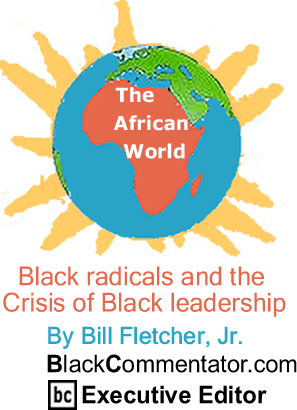
|
||||||||||||||||||||||
 |
||||||||||||||||||||||
 |
||||||||||||||||||||||
 |
||||||||||||||||||||||
 |
||||||||||||||||||||||
 |
||||||||||||||||||||||
 |
||||||||||||||||||||||
 |
| The current issue is always free to everyone |
|
|
 |
I hope that you will be joining me at the Black
Radical Congress conference in The issues that confront Black America, not to mention the rest of the
The problem is that while electoral politics can and should play a critical role in any progressive movement, it accomplishes very little if there is no organization on the ground. Furthermore, if Black radicals (broadly defined) are divorced from the concerns of grassroots Black folks and the struggles in which they are engaged, we have only a limited impact. A friend of mine recently discussed what he termed “professional commentators”
as being the description of many alleged activists who are
not or have not been involved directly in the everyday battles
of our people, whether such battles are around police brutality
or for organizing a union. I thought for a while about this
expression and believe that there is some truth to this. Yet, my friend is pointing to a deeper problem. If we believe that our activism is limited to Internet interventions, and the responses that we get, we not only discount those who are not on-line, but we are actually encouraging relatively passive activity. In that sense, it is important to connect on-line activism with direct, one-on-one activism. This is not enough, however. Black progressives and leftists seem to have
difficulty linking a strategic direction with organizational
sustainability. Let me put it another way: we can talk until
the cows come home about what we need to do and where we need
to go, but we have to figure out how we will get there. Let’s
take the wars in Taking such steps often seems to elude us for reasons that I cannot fathom.
Not only that, there is a reluctance to accept that we can
have differences, sometimes very sharp differences, within
the same organization. The net impact of this sort of behavior has been a relative paralysis within the Black Freedom Movement in the face of the challenges mentioned above. I do not wish to pin this on our enemies - who certainly delight in our troubles - but they are certainly the chief beneficiaries. We have to take responsibility for this situation, which means that we need to take steps to correct it.
I am not going to the BRC conference expecting miracles. I am going because I feel that I have something to learn. I am also going because of my assumption that through vehicles such as the BRC one can multiply the impact of individual activism, uniting with the strengths of others in order to accomplish a clearly defined purpose. Will I see you in BlackCommentator.com Executive
Editor, Bill Fletcher, Jr., is a Senior Scholar with the Institute for Policy Studies,
the immediate past president of TransAfrica Forum and co-author of the just released book,
Solidarity Divided: The Crisis in Organized Labor and a New Path
toward Social Justice
|
Any BlackCommentator.com article may be re-printed so long as it is re-printed in its entirety and full credit given to the author and www.BlackCommentator.com. If the re-print is on the Internet we additionally request a link back to the original piece on our Website. Your comments are always welcome. eMail
re-print notice
If you send us an eMail message we may publish all or part of it, unless you tell us it is not for publication. You may also request that we withhold your name. Thank you very much for your readership. |
|
| June
19, 2008 Issue 282 |
|
| Executive Editor: Bill Fletcher, Jr. |
| Managing
Editor: |
| Publisher: Peter Gamble |
| Est. April 5, 2002 |
| Printer Friendly Version in resizeable plain text format or pdf format. |
 |
 |
 |
| |
| |























 Among
left-of-center Black activists, in the face of this crisis
there is confusion, if not disarray. Some people are pinning
all of their hopes on a Barack Obama victory in November as
laying the foundations for turning the tide on this situation.
Others, in discounting both the Obama campaign and a possible
Obama presidency, are focused on the Cynthia McKinney candidacy
as being the true voice for Black progressives and leftists,
or they may be considering other campaigns, such as Ralph
Nader’s.
Among
left-of-center Black activists, in the face of this crisis
there is confusion, if not disarray. Some people are pinning
all of their hopes on a Barack Obama victory in November as
laying the foundations for turning the tide on this situation.
Others, in discounting both the Obama campaign and a possible
Obama presidency, are focused on the Cynthia McKinney candidacy
as being the true voice for Black progressives and leftists,
or they may be considering other campaigns, such as Ralph
Nader’s.







